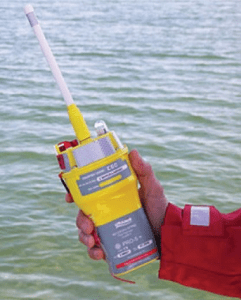Once you decide to request assistance from the Coast Guard, what means should you use? This depends to a large degree on where you’re located and what gear you have available. The Coast Guard Rescue Coordination Center (RCC) can become aware of a mayday situation through one of several means:
- A VHF-FM call, either using the Digital Selective Calling “Distress” button, or by voice. The Coast Guard’s Rescue 21 system extends 20-40 nautical miles offshore in the continental
- US, Great Lakes, Hawaii, southern Alaska, and Trust Territories
- A single-sideband call to one of four channels monitored by the Coast Guard (4125, 6215, 8291, 12290)
- An EPIRB or PLB signal, routed through satellites, ground stations, the Mission Control Center, and finally to the RCC
- A telephone call via cellular phone or satellite phone (Store the number for your local RCC in the phone’s memory before you shove off)
- A report of a flare sighting from shore or another vessel
- Use of internationally recognized distress signals (See Chapter 13, Signaling)
- A report from another vessel or a Mayday Relay
- Overdue vessel report from a friend or relative
When communicating with the Coast Guard, your first choice of method should be the one that is easiest for them. They are particularly adept at using information from Rescue 21, or the COSPAS-SARSAT system (EPIRBs and PLBs), compared to receiving a phone call. Although the 911 service in your area can provide a location to the Coast Guard, the Coast Guard cannot determine it if you call them directly. Similarly, an alert from a SEND device (satellite texting transceiver) has to pass through a private company before it will be forwarded to the Coast Guard.
Most safety experts encourage calling for help via VHF-FM radios rather than cellular telephones. This is correct, but the ability to call virtually any phone number in the world can be useful too. If you’re sending a Mayday, a VHF-FM radio is preferred; if you’re trying to reach a specialist to solve a specific problem, use your phone.
Once the Coast Guard’s local Maritime Rescue Coordination Center (MRCC) has been notified of your emergency, a SAR Mission Coordinator assesses the nature of the danger to your vessel and crew, your distance from shore, and the assets available to aid in a rescue. The more precise the vessel’s position, the better; as the search area grows, searches become more expensive (and are less likely to result in a good outcome).
This is an excerpt from the Safety at Sea Guide.

